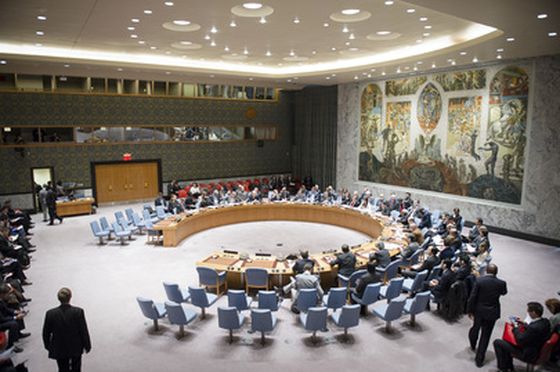The whose security Council controls the UN?

As you know, the UN is about 300 States, including microscopic and exotic, like Nauru or Vanuatu. The head of this world organization, which is a type of world government, the General Assembly and has mostly representative functions, the Secretary-General, and between it, the Assembly sessions, all the Affairs of planet Earth run by a security Council consisting of 15 members, 5 of which are permanent.
The UN was established in 1945 at the end of WW2 to replace the League of Nations, in fact, unrecognized and excluded the USA from the USSR. The US never ratified membership in LN, and the USSR joined in 1934, was ignominiously expelled in 1939 for aggression against Finland.
Over the years since 1945 the UN has become a recognized collective international instrument to resolve disputes, conflicts and develop common approaches to complex problems.
Gradually, however, as in any long-lasting structures, the UN has accumulated problems and contradictions that reduce its effectiveness. In particular, it concerns the security Council. The permanent members of the security Council – the U.S., Britain, France, China and Russia have veto power and therefore uncontrolled actually own the UN.
In 1945 these countries have been major winners in WW2 and their dominance seemed reasonable and even benefited, providing for the trial of the major war criminals of Germany and Japan, who instigated WW2.
Currently, however, the eternal principle of permanent membership of 5 States from more than 200 interferes very democratic nature of the UN, and permanent members themselves, due to a change in the balance of power in the world, no longer reflect the real picture of relations between the countries of the world.
New powerful players, such as India, Germany, Japan, Indonesia, Brazil, Malaysia justifiably claim leadership in the world and, accordingly, in the UN.
As for Russia, its role in the world economy barely allows you to stay in the G-20, not to mention full compliance with the criteria for membership in G-8, which led her to the exclusion of the Crimea and the Donbass…
Yes, and legally there are a lot of questions. In particular the fact that their statehood, Russia was established in 1991 with a clean slate, not having preserved the succession from the RSFSR, as the co-founder of the USSR in 1922, simply suggests that the continuity from the USSR and the RSFSR is unprovable. It even, unlike Ukraine and Belarus, is the founder of the UN. So if not nuclear club, we’d have to keep it a warm place hard.
Complicated history with China. The founder of the UN in 1945, the Kuomintang was China, he was ranked as one of the winners in WW2, legitimate place in the UN security Council. But then, the Kuomintang government of China was lost to Mao TSE-Tung forced to fled to Formosa (Taiwan), and the place in SA summon the government of the PRC…
So that recovery of the unethical situation around SA requires reform of the UN security Council. Or the institution of permanent membership should be canceled, or become permanent members of the security Council should be additionally introduced real leaders of the industrial and social development, and that the above-mentioned Germany, Japan, Indonesia, Brazil, India, Malaysia and a dozen countries, coming at their heels…
Itself the right of veto as it is not vysokokonkurentnom looks in the modern world where there are no quoted brazen dictatorship in all its forms…
It is preferable to abandon the right of veto of the permanent members of the UN security Council, replacing it for responsible cases world life by a qualified majority of those regular members…








